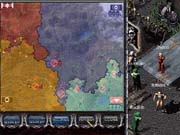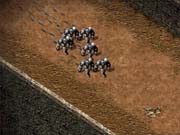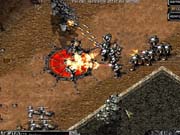With Shattered Galaxy, the US version of Nexon's enormously popular Korean game, real-time strategy enters the realm of massively multiplayer gaming. But the question is, does it belong there? Fans of online games like EverQuest will certainly appreciate what Shattered Galaxy achieves. But if you've cut your teeth on Warcraft and Command & Conquer, perfected Brawler rushes in Total Annihilation, and stayed up until 3am playing Age of Empires II, you'll find that Shattered Galaxy is, in ways, the exact opposite of what you've come to expect from the real-time strategy genre. However, if you approach Shattered Galaxy on its own terms, you'll find in it a solid, appealing, and unique new game.

When you log on to Shattered Galaxy, you're staring at what looks very much like Ultima Online. Your avatar is a hero with several attributes, and you can walk him around a little city, rubbing elbows with other heroes whose names and ranks hover overhead. The first building you'll visit is a factory, where you can buy units. Money is rarely a problem, since units and repairs are incredibly cheap. Instead, the limiting factor on what's available is your hero's influence, which is increased by fighting battles. When your influence is high enough, you can buy advanced units, customize your existing units with new components, or update them to improved models.
This is one of the best things about Shattered Galaxy. There's an incredible amount of breadth in terms of how you advance. You have a level in each of the four divisions, each of which correspond to unit types: infantry, mobile, air, and alien organic units. You also have an honor rating, which represents how well you've served your faction and gives your units more hit points. You have prestige, a measure of how successful you've been against other players, which determines your political standing. You have improvable attributes that tweak rules, like how many units you can take into battle or how many components you can fit into a unit's chassis. Furthermore, each of your units has its own personal experience level and influence rating. Shattered Galaxy sometimes looks like an unsightly sprawl of details, but it keeps you constantly on the verge of new milestones. There's always something to improve, some new toy to buy, some reason to play just one more battle. This is one of the basic tenets of massively multiplayer online gaming: keep giving players something to look forward to, and they'll keep paying $10 a month for the service. There's no denying that Shattered Galaxy does this well.

But then there's the issue of how it plays as a real-time strategy game. To advance, the game all but forces you into battles against other human players. This is the only way you can earn the influence you need to unlock better units. You're aligned with one of four factions vying for control of adjoining sectors, each representing a single battle map. When one side attacks another side's sector, a 20-minute battle begins. Whoever holds the most victory locations when time runs out wins the sector and, more importantly, the most experience.
The battles can be spectacular, tense, and exciting, with one caveat: You're always limited to one small corner of the action. Initially, you can use only six units at a time (this number can increase as you gain levels), so success relies heavily on coordinating your actions with the other combatants from your faction. By the time a battle is over, more than 20 players might have joined in. If everyone shows up with artillery or flying units, you're sunk. If no one's on defense, you're sunk. If your faction scatters after several different victory locations, you're sunk. Even more so than in team-based multiplayer shooters like Team Fortress or Tribes, Shattered Galaxy is all about playing your part in the big picture rather than running off on your own. To some players, this might seem contrary to the whole point of real-time strategy games, in which the focus is usually on letting you create and command a force of combined arms and maneuvering them across the battlefield to outsmart or overwhelm your opponent. If you expect to personally oversee every aspect of battle, then you'll be in for a rude awakening when you begin playing Shattered Galaxy and soon discover that much of the action is out of your direct control.
Otherwise, as a real-time strategy game, Shattered Galaxy works very well. Although the battles are short, there's a lot of back-and-forth. Reinforcements continually arrive as new players join in, so there's a sense, up until the last few seconds, that a battle can go either way. The wide variety of unit types is arranged in an intricate rock-paper-scissors relationship. Then there are all the special abilities that come into play: Infiltrators, cloaking, mines (land and air), sensors, teleporting, long-range missiles, snipers, and disabling attacks are all available once you reach the higher levels. Granted, you have to muck around with a lot of relatively less-interesting low-level technology before you get to play with these elements, but you'll still see other players using them on the battlefield.

Actually, the disparity of player levels can be one of Shattered Galaxy's problems. A higher-level player with advanced units is going to bulldoze through most of his opponents. What makes this particularly troublesome is that there's no convenient indication of how powerful or how damaged an enemy unit is. Are those first-level rookies, or souped-up veterans tricked out with uber weapons? Are they almost dead or are they fresh reinforcements? Do you run for help or fight? You won't know the answers until the shooting starts. Even then, you might not know until they've killed all your units and you've failed to inflict a single casualty.
There are plans for Shattered Galaxy to split into multiple planets geared toward different experience levels. This should help address a common problem previously seen in the game, where a handful of maximum-level characters dominate the battles, making the low-level ramping an exercise in frustration. You simply throw your units to their deaths over and over. Fortunately, destroyed units are cheaply repaired after a battle.

From a technical standpoint, Shattered Galaxy is somewhat primitive. It runs in 800x600 resolution, uses blatantly 2D graphics, and is squeezed into a cramped viewing area. Its sci-fi sound effects are generally unremarkable. Fortunately, it does give you a helpful minimap with grid coordinates, which is a great boon to communication with other players. Also, shortly after its US release, a patch added some helpful unit management features. Although the servers are surprisingly stable (the load tends to hover at a modest 400 players), there are a few bugs yet to be addressed. For instance, the unit pathfinding is rather poor--you'll find that one of your few units will occasionally stray from the pack because it can't figure out how to get up a crowded ramp.
On the other hand, the ongoing and persistent nature of the game universe gives Shattered Galaxy something missing from most real-time strategy games, even those with superior technology. This isn't necessarily a better way to play real-time strategy, and it's certainly not going to replace any of your favorites. But it is new and intriguing. If you can accept your limited role in the war, if you can stomach the dated technology, and if you're willing to struggle through the tedious early hours, then you'll find Shattered Galaxy offers plenty to keep you engaged over the long run.